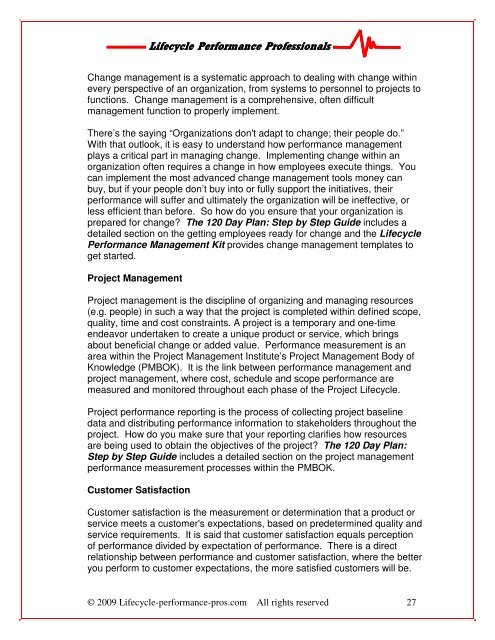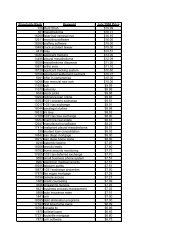Download the Performance Management Fundamentals Guide
Download the Performance Management Fundamentals Guide
Download the Performance Management Fundamentals Guide
Create successful ePaper yourself
Turn your PDF publications into a flip-book with our unique Google optimized e-Paper software.
Lifecycle Lifecycle <strong>Performance</strong> <strong>Performance</strong> Professionals<br />
Professionals<br />
Change management is a systematic approach to dealing with change within<br />
every perspective of an organization, from systems to personnel to projects to<br />
functions. Change management is a comprehensive, often difficult<br />
management function to properly implement.<br />
There’s <strong>the</strong> saying “Organizations don't adapt to change; <strong>the</strong>ir people do.”<br />
With that outlook, it is easy to understand how performance management<br />
plays a critical part in managing change. Implementing change within an<br />
organization often requires a change in how employees execute things. You<br />
can implement <strong>the</strong> most advanced change management tools money can<br />
buy, but if your people don’t buy into or fully support <strong>the</strong> initiatives, <strong>the</strong>ir<br />
performance will suffer and ultimately <strong>the</strong> organization will be ineffective, or<br />
less efficient than before. So how do you ensure that your organization is<br />
prepared for change? The 120 Day Plan: Step by Step <strong>Guide</strong> includes a<br />
detailed section on <strong>the</strong> getting employees ready for change and <strong>the</strong> Lifecycle<br />
<strong>Performance</strong> <strong>Management</strong> Kit provides change management templates to<br />
get started.<br />
Project <strong>Management</strong><br />
Project management is <strong>the</strong> discipline of organizing and managing resources<br />
(e.g. people) in such a way that <strong>the</strong> project is completed within defined scope,<br />
quality, time and cost constraints. A project is a temporary and one-time<br />
endeavor undertaken to create a unique product or service, which brings<br />
about beneficial change or added value. <strong>Performance</strong> measurement is an<br />
area within <strong>the</strong> Project <strong>Management</strong> Institute’s Project <strong>Management</strong> Body of<br />
Knowledge (PMBOK). It is <strong>the</strong> link between performance management and<br />
project management, where cost, schedule and scope performance are<br />
measured and monitored throughout each phase of <strong>the</strong> Project Lifecycle.<br />
Project performance reporting is <strong>the</strong> process of collecting project baseline<br />
data and distributing performance information to stakeholders throughout <strong>the</strong><br />
project. How do you make sure that your reporting clarifies how resources<br />
are being used to obtain <strong>the</strong> objectives of <strong>the</strong> project? The 120 Day Plan:<br />
Step by Step <strong>Guide</strong> includes a detailed section on <strong>the</strong> project management<br />
performance measurement processes within <strong>the</strong> PMBOK.<br />
Customer Satisfaction<br />
Customer satisfaction is <strong>the</strong> measurement or determination that a product or<br />
service meets a customer's expectations, based on predetermined quality and<br />
service requirements. It is said that customer satisfaction equals perception<br />
of performance divided by expectation of performance. There is a direct<br />
relationship between performance and customer satisfaction, where <strong>the</strong> better<br />
you perform to customer expectations, <strong>the</strong> more satisfied customers will be.<br />
© 2009 Lifecycle-performance-pros.com All rights reserved 27










